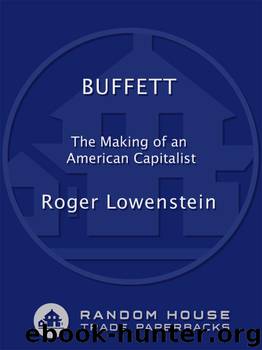Buffett by Roger Lowenstein

Author:Roger Lowenstein [Lowenstein, Roger]
Language: eng
Format: epub
ISBN: 978-0-8041-5060-6
Publisher: Random House Publishing Group
Published: 2013-07-23T16:00:00+00:00
The alternative method of raising cash was for insurers to write more policies, which Buffett judged would cause the industry to write as much business as possible, driving premiums down to unprofitable levels and spurring huge losses in underwriting. All this unfolded as writ. Berkshire itself had minimal exposure to long-term bonds, the purchase of which, Buffett noted, was equivalent to “selling money” at a fixed price for thirty years. In an inflationary era, this was no less suicidal than agreeing to set a price on Hathaway yarn for the year 2010.
Alas, understanding inflation did not provide immunity to it. Buffett pointed out, with no little agony, that when he had taken over Berkshire the book value of one share could have bought one half-ounce of gold and that, after fifteen years in which he had managed to raise the book value from $19.46 a share to $335.85, it would still buy the same half-ounce.33
The best that he could do was to invest in companies that might resist inflation’s ravages, such as General Foods and R. J. Reynolds Industries. Buffett figured that well-known consumer brands, such as Post cereals and Winston cigarettes, would be able to raise prices at a pace with inflation. He also bought hard-commodity stocks, such as Aluminum Co. of America, Cleveland-Cliffs Iron, Handy & Harman, and Kaiser Aluminum & Chemical. But as Buffett would remind his readers, neither Berkshire nor anyone had a “remedy” for the problem. Inflation was a “gigantic corporate tapeworm” that “preemptively consumes its requisite daily diet of investment dollars regardless of the health of the host organism.”34
On Wall Street, inflation had triggered a frantic hunt for corporate assets. Companies, like people, were desperate to convert money to anything other than cash, igniting the takeover mania of the early eighties. Venerable names, such as Del Monte, National Airlines, Seven-Up, Studebaker, and Tropicana, were being swallowed up at huge premiums. This spurred the multimillionaire Buffett to adopt the unlikely role of one of Wall Street’s most scathing critics.
In his view, the vanity of corporate CEOs was leading to irrational deals. CEOs were, by natural Darwinian selection, excessively energetic sorts, seldom “deficient in animal spirits.” They measured themselves by the size of their castle, rather than by Buffett’s yardstick of profitability (which to him was the only rational goal). Instead of buying small pieces of companies on the cheap, as Buffett did, these CEOs preferred to take full bites at more than full prices. Not to worry, though—these CEOs, being by the same Darwinian process an egocentric bunch, believed that their talents would justify their paying such lofty prices:
Many managements apparently were overexposed in impressionable childhood years to the story in which the imprisoned handsome prince is released from a toad’s body by a kiss from a beautiful princess. Consequently, they are certain their managerial kiss will do wonders for the profitability of Company T(arget)…. We’ve observed many kisses but very few miracles.35
Download
This site does not store any files on its server. We only index and link to content provided by other sites. Please contact the content providers to delete copyright contents if any and email us, we'll remove relevant links or contents immediately.
Rich Dad Poor Dad by Robert T. Kiyosaki(6632)
Pioneering Portfolio Management by David F. Swensen(6300)
How To Win Friends and Influence People by Dale Carnegie(4512)
The Money Culture by Michael Lewis(4207)
The Dhandho Investor by Mohnish Pabrai(3764)
The Wisdom of Finance by Mihir Desai(3746)
Liar's Poker by Michael Lewis(3448)
Fooled by Randomness: The Hidden Role of Chance in Life and in the Markets by Nassim Nicholas Taleb(3124)
The ONE Thing by Gary Keller(3071)
Mastering Bitcoin: Programming the Open Blockchain by Andreas M. Antonopoulos(3042)
The Intelligent Investor by Benjamin Graham Jason Zweig(3041)
The Psychology of Money by Morgan Housel(3036)
Rich Dad Poor Dad: What The Rich Teach Their Kids About Money - That The Poor And Middle Class Do Not! by Robert T. Kiyosaki(2958)
Investing For Dummies by Eric Tyson(2953)
How to Day Trade for a Living: Tools, Tactics, Money Management, Discipline and Trading Psychology by Andrew Aziz(2949)
How to Win Friends and Influence People by Dale Carnegie(2915)
Market Wizards by Jack D. Schwager(2700)
How to Pay Zero Taxes, 2018 by Jeff A. Schnepper(2655)
Zero Hour by Harry S. Dent Jr. & Andrew Pancholi(2647)
